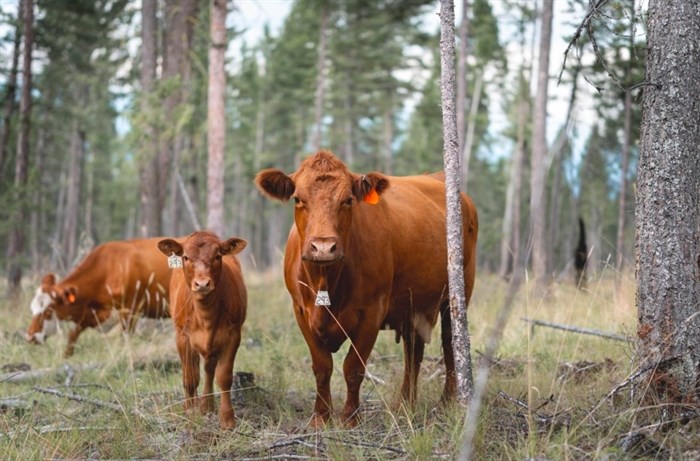
FILE PHOTO
Image Credit: SUBMITTED/B.C. Cattlemen's Association
January 30, 2022 - 3:33 PM
The summer’s floods, wildfires and extreme heat has meant a shortage of feed for cattle ranchers in the southern Interior.
The foraging supply in B.C, the hay and grass products that cattle graze on, is currently in short supply due to last year's climate change disasters. It’s also impacted the winter feed supply as less grain was able to be grown with the heat, said Kevin Boon, general manager with the B.C. Cattlemen’s Association.
A lot of grain shipments, like corn which grows better with heat, coming from the U.S. have been also been impacted as supply chain problems continue due to COVID-19, he said.
READ MORE: Canadian cattle producers desperate as feed shortage reaches crisis levels
“Some of the guys have been switching to utilizing some grain as a supplement in order to stretch the hay out, so we are being faced with shortages in that grain supply here as well. It’s a compounding of weather, natural disasters and COVID that have created this perfect storm, where we are having difficulty,” Boon said.
At this time, there hasn’t been an immediate impact on the consumer, he said. The price of beef has risen in the last year at a processing level, but not at the production of beef.
READ MORE: Flyers, coupons and discounts: 'Sticker shock' changing how Canadians buy groceries
“But if these guys are running out of corn, or running out of barley or the grains that they typically feed to these cattle, there’s two things are going to happen,” Boon said.
Cattlemen will have to start paying more for the transportation of food, so it could increase the cost of production or if they can’t get the grain and have to start rationing the cattle, meaning it will take longer to get to animals onto the plate.
“Every extra day costs extra money so that cost again of production again will go up,” Boon said. “What will typically happen will be a loss at the feedlot end and it will get made up later down the road.”
The impact may not be seen for three to four months on the consumer level, he said, but he thinks it will be a while before the difference would be seen on the price tags.
Cutting back the food for cattle also throws their health program off, making them more susceptible to health issues.
Executive director of the B.C. Association of Cattle Feeders, Andrea van Iterson, said it’s been a logistics nightmare as they’ve shifted to a more corn-based diet for their cattle.
The cattle she has in Westwold are grown until a finishing stage and are mostly processed in Alberta. A few are finished for a local market in B.C.
“For forages, (grass and hay products) people are doing their best to try to source it, but it’s my understanding it’s out there and the cost is a lot greater than what a lot of people are able to pay,” she said.
“We’ve had some pretty big cow sales the last little bit and I guess there’s a bunch more coming up in the near future. That’s not 100% seasonally usual but I think we’re seeing a bit more which can be attributed to some forage shortages and the cost issue on the grain side.”
Traditionally, barley is a main source of feed for cows in Western Canada but feedlots owners have had to pivot and use more corn while battling logistical programs with the railways, highway closures and the lack of truckers.
“We’ve had to make some major shifts in the types of product that we feed, but luckily we’ve been able to do that but the logistics of it have been really difficult,” van Iterson said.
She doesn’t think it will be a long-term issue that will impact the consumer, but “if we don’t have some moisture going into the spring on the prairies and planting, we very well could be in this situation again and see decreased cattle numbers but I don’t have enough of an educated guess to make that assumption.”
To contact a reporter for this story, email Carli Berry or call 250-864-7494 or email the editor. You can also submit photos, videos or news tips to the newsroom and be entered to win a monthly prize draw.
We welcome your comments and opinions on our stories but play nice. We won't censor or delete comments unless they contain off-topic statements or links, unnecessary vulgarity, false facts, spam or obviously fake profiles. If you have any concerns about what you see in comments, email the editor in the link above.
News from © iNFOnews, 2022